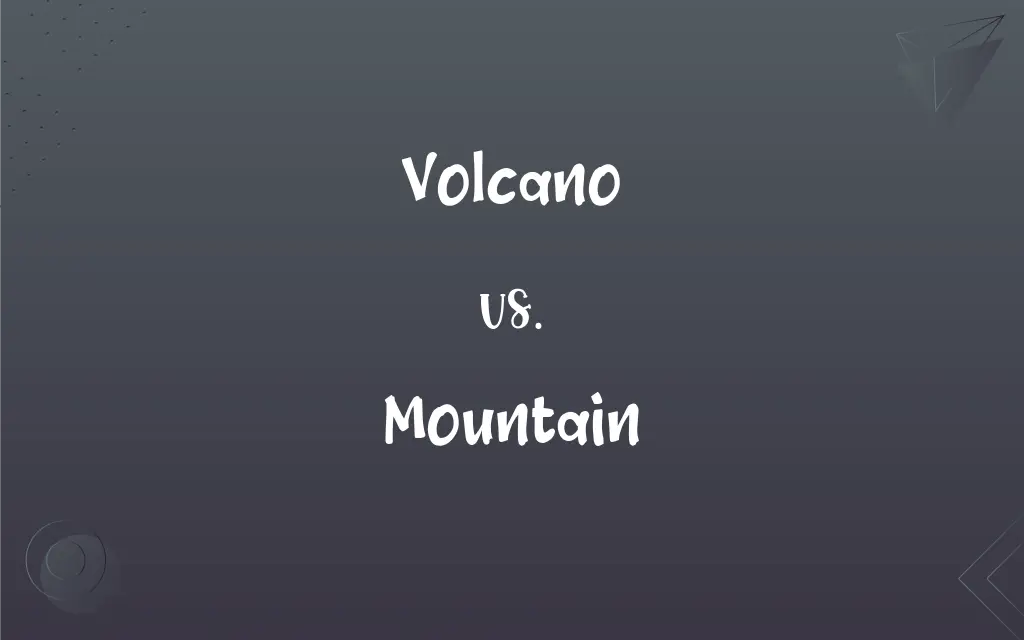Volcano vs. Mountain: What's the Difference?
Edited by Aimie Carlson || By Janet White || Published on November 3, 2023
A volcano is a geological formation from which molten rock and gas erupt, while a mountain is a large natural elevation of the Earth's surface.

Key Differences
A volcano is a unique landform that has an opening in the Earth's crust, allowing molten rock, ash, and gases to erupt. Conversely, a mountain is a broad term for any significant elevation or prominence on the Earth's surface, not necessarily having volcanic activity.
The formation of a volcano is typically associated with tectonic plate movements, where magma from the mantle rises to the surface. On the other hand, mountains can form from various geological processes, including volcanic activity, but also from the uplift caused by tectonic collisions.
Volcanoes can be active, dormant, or extinct, depending on their eruption history. Active volcanoes have recent histories of eruptions, dormant ones haven't erupted in a long time but might again, and extinct ones are not expected to erupt again. Mountains, irrespective of their origin, don't have such classifications related to activity.
The topography of a volcano often features a crater or caldera, a depression formed due to eruptions. While some mountains may have peaks, valleys, and other features, they don't necessarily possess craters or calderas unless they have a volcanic origin.
A volcano has the potential to cause significant damage and reshape landscapes through eruptions. In contrast, a mountain generally stands as a stable structure that influences local climate, biodiversity, and human settlements but doesn't undergo sudden violent changes
ADVERTISEMENT
Comparison Chart
Definition
Geological formation with eruptions
Large natural elevation
Formation Cause
Tectonic activity and magma
Various, including tectonics and erosion
Activity Classification
Can be active, dormant, or extinct
No such classification
Topographic Features
Crater or caldera
Peaks, ridges, valleys
Impact
Can erupt and reshape landscapes
Stable, influences climate and ecosystems
ADVERTISEMENT
Volcano and Mountain Definitions
Volcano
A mount that can expel lava, ash, and volcanic gases.
Villagers evacuated due to the sudden activity of the nearby volcano.
Mountain
A raised landform resulting from tectonic forces or erosion.
The mountain range stretched for miles, forming a natural barrier.
Volcano
A landform with an opening that can erupt with magma and gases.
Mount St. Helens is a famous volcano in the United States.
Mountain
A steep and elevated terrain feature dominating the landscape.
The village nestled in the mountain's shadow relied on spring water.
Volcano
A hill or mountain with a crater from past eruptions.
The ancient city was buried when the volcano erupted.
Mountain
A significant land prominence higher than a hill.
The mountain's peak was covered in snow year-round.
Volcano
An opening in the earth's crust from which lava, ash, and hot gases flow or are ejected during an eruption.
Mountain
A large natural elevation on Earth's surface.
Mount Everest is the highest mountain in the world.
Volcano
A similar opening on the surface of another celestial object.
Mountain
A vast geological structure often with a notable peak.
Climbing the mountain was a test of endurance and skill.
Volcano
A usually cone-shaped mountain formed from the materials issuing from such an opening.
Mountain
Abbr. Mt. or Mtn. A natural elevation of the earth's surface having considerable mass, generally steep sides, and a height greater than that of a hill.
Volcano
A vent or fissure on the surface of a planet (usually in a mountainous form) with a magma chamber attached to the mantle of a planet or moon, periodically erupting forth lava and volcanic gases onto the surface.
Iceland's volcanoes are among the most active on Earth.
Mountain
A large heap
A mountain of laundry.
Volcano
A kind of firework producing an upward plume of sparks.
Mountain
A huge quantity
A mountain of trouble.
Volcano
To erupt; to burst forth
Mountain
(countable) An elevation of land of considerable dimensions rising more or less abruptly, forming a conspicuous figure in the landscape, usually having a small extent of surface at its summit.
Everest is the highest mountain in the world.
We spent the weekend hiking in the mountains.
Volcano
A mountain or hill, usually more or less conical in form, from which lava, cinders, steam, sulphur gases, and the like, are ejected; - often popularly called a burning mountain.
Mountain
(countable) Something very large in size or quantity; a huge amount; a great heap.
He was a real mountain of a man, standing seven feet tall.
There's still a mountain of work to do.
Volcano
A fissure in the earth's crust (or in the surface of some other planet) through which molten lava and gases erupt
Mountain
(figuratively) A difficult task or challenge.
Volcano
A mountain formed by volcanic material
Mountain
Wine from Malaga made from grapes that grow on a mountain.
Volcano
An opening in the Earth's crust emitting molten rock.
When the volcano erupted, it spewed lava across the landscape.
Mountain
A woman's large breast.
Volcano
A geothermal feature indicating tectonic activity below.
Scientists monitor the volcano for signs of impending eruptions.
Mountain
(cartomancy) The twenty-first Lenormand card.
Mountain
A large mass of earth and rock, rising above the common level of the earth or adjacent land; earth and rock forming an isolated peak or a ridge; an eminence higher than a hill; a mount.
Mountain
A range, chain, or group of such elevations; as, the White Mountains.
Mountain
A mountainlike mass; something of great bulk; a large quantity.
I should have been a mountain of mummy.
Mountain
Of or pertaining to a mountain or mountains; growing or living on a mountain; found on or peculiar to mountains; among mountains; as, a mountain torrent; mountain pines; mountain goats; mountain air; mountain howitzer.
Mountain
Like a mountain; mountainous; vast; very great.
The high, the mountain majesty of worth.
Mountain
A land mass that projects well above its surroundings; higher than a hill
Mountain
A large number or amount;
Made lots of new friends
She amassed a mountain of newspapers
Mountain
Relating to or located in mountains;
Mountain people
FAQs
Are all volcanoes mountains?
While many volcanoes take a mountainous form, not all mountains are volcanoes.
Which is higher, a hill or a mountain?
A mountain is typically higher and steeper than a hill.
Can a volcano be underwater?
Yes, submarine volcanoes exist beneath the ocean's surface.
What causes a volcano to erupt?
Tectonic movements and pressure from magma can trigger volcanic eruptions.
What does a volcano emit during an eruption?
A volcano can emit lava, ash, and various gases.
Can we predict volcanic eruptions?
While exact predictions are challenging, monitoring can give indications of potential eruptions.
How do mountains affect biodiversity?
Different altitudes on a mountain create varied habitats, leading to diverse flora and fauna.
Do mountains grow over time?
Some mountains, like the Himalayas, are still rising due to tectonic forces.
How do mountains influence climate?
Mountains can block or redirect prevailing winds, creating rain shadows or altering temperatures.
Are there benefits to living near mountains?
Yes, from fresh water sources to diverse ecosystems and scenic beauty.
What is the difference between lava and magma?
Magma is molten rock beneath the Earth's surface, while lava is magma that reaches the surface during a volcanic eruption.
What are the dangers of living near a volcano?
Risks include eruptions, ashfall, lava flows, and pyroclastic flows.
What's the tallest mountain in the world?
Mount Everest is the tallest mountain above sea level.
Are mountains found on other planets?
Yes, planets like Mars have mountainous features.
How are mountains formed?
Through various processes, including tectonic collisions, volcanic activity, and erosion.
Why are some volcanoes more explosive than others?
The magma's composition, temperature, and gas content can influence the explosiveness.
What is the significance of mountain ranges in continents?
They influence climate, river systems, and human settlements.
How do volcanoes impact the climate?
Large eruptions can emit particles and gases that cool the global climate temporarily.
What's the Ring of Fire?
A tectonic zone with many active volcanoes, encircling the Pacific Ocean.
Do mountains play a role in folklore and culture?
Yes, many cultures revere mountains as sacred or as places of myth and legend.
About Author
Written by
Janet WhiteJanet White has been an esteemed writer and blogger for Difference Wiki. Holding a Master's degree in Science and Medical Journalism from the prestigious Boston University, she has consistently demonstrated her expertise and passion for her field. When she's not immersed in her work, Janet relishes her time exercising, delving into a good book, and cherishing moments with friends and family.
Edited by
Aimie CarlsonAimie Carlson, holding a master's degree in English literature, is a fervent English language enthusiast. She lends her writing talents to Difference Wiki, a prominent website that specializes in comparisons, offering readers insightful analyses that both captivate and inform.
































































